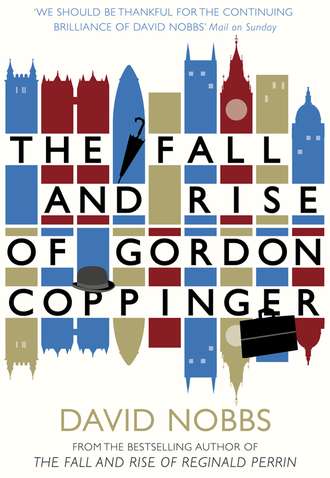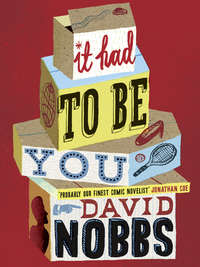
Полная версия
The Fall and Rise of Gordon Coppinger
The eponymous owner was not present in the Sir Gordon Coppinger Stand yesterday to see his Eastern European protégé miss yet more chances. Nor was Bogoff’s lovely wife, the svelte Svetoslava.
Could it be that her presence in Britain, and her absence from the match, has something to do with Sir Gordon’s continued faith in her hapless hubby?
Sir Gordon loved to read about other great men, and he knew that all truly great men had to be vigilant in their examination of themselves for traces of incipient paranoia. He was honest enough to wonder if there was a touch of the disease in his suspicion that there might be a connection between this story and the diary piece about Christina. Had the press decided to go on the offensive against him, albeit slowly and carefully, putting their toes into the ocean with little hints? Well, they were hopelessly on the wrong tack with Svetoslava. Apart from everything else, he didn’t know when he had seen a less svelte Slav.
But even this very gentle rumour and tittle-tattle made him feel uneasy, and he wasn’t used to feeling uneasy. He’d have liked a third cup of good old British tea, but it was out of the question. Great men can’t be seen clambering out of their Rolls-Royces for a quick pee at the side of the Kingston By-Pass, or taking a bottle with them just in case. To be seen by Kirkstall performing awkward manoeuvres into a bottle on the back seat, it was unthinkable. The urination of great men – and indeed of great women – must be hidden from the world.
Through the huge picture windows of the dining room he could now see that an unlovely dawn was creeping shyly in over the lush Surrey countryside. Dawns didn’t break, they arrived mysteriously. As a boy he had sometimes stood by the window in the dark in that little house in Dudley, stopwatch in hand, waiting to record the exact second when it began to get light, in order to enter it into ‘Coppinger’s Almanac’, his life’s work. He had always failed, and the failure had made him furious. He never failed now, and he was rarely furious. Fury used up energy that needed to be stored for more important use.
He was pleased that it was such an unappetizing grey morning. What was the point of being driven to work by a chauffeur in a luxurious Rolls-Royce if the hoi polloi in their ghastly clothes were standing at their bus stops in warm sunshine? He hoped it would chuck it down this evening, so that all the trick-or-treaters would get soaked.
He turned, reluctantly, to the financial pages.
Insecurity grows. House prices fall. CBI wants tax breaks to help young unemployed.
What? Tax breaks? Help for the young unemployed? He almost choked on his last sip of tea.
China: Don’t count on us to help you.
Bastards. Who was ever naive enough to think they would? He’d boycotted Chinese restaurants for five years now. That had shown them.
In a sudden surge of temper he flung the papers to the floor.
He clambered slightly stiffly out of his chair. That wouldn’t do. He was only fifty-six, and fifty-six was the new forty-three.
He picked the papers up, smoothed them down, and put them in a neat pile.
Thank goodness nobody had witnessed his brief rage. He never lost his temper. He was always cool and collected. Nobody ever saw him ruffled.
He would have been astonished if he’d known that this would be one of the reasons for the suspicions that would overwhelm him.
It was going to be one of those days
It was a day like any other, and yet it was a day like none other. Everything was as it usually was, yet nothing was as it usually was.
Every moment of every day in the life of Sir Gordon Coppinger (fifty-six), control freak, of Rose Cottage, Borthwick End, near Borthwick Magna, in the county of Surrey, was calculated, planned, and conducted with calm authority. On this grey Halloween morning, however, a ghost of anxiety sat on his shoulder, drove with him into that strange place known as Canary Wharf – half smart city, half urban village – accompanied him as Kirkstall steered smoothly past trim tower blocks whose names on their summits proclaimed the point of the place: Barclays, HSBC, Credit Suisse, J.P. Morgan, Coppinger.
The anxiety walked with him up the steps and through the wide glass doors into the great foyer of the slim, sleek, Coppinger Tower, affectionately known, because of its ribbed structure, and the delicate frond-like curves at its top, as the Stick of Celery. The Coppinger Tower stood a little off the centre of Canary Wharf, but commanded a splendid view over a long bend of London’s river. At its top gleamed that single, powerful word, in gold letters: ‘Coppinger’.
On this grey Halloween morning he took with him, past all the huge rubber plants, only the appearance of calm authority. He was more shaken by the manner of his awakening than he would ever admit. It was as if for those moments of blankness he had been outside his body, and it was as if he still hadn’t quite slipped fully back in, didn’t quite fit neatly yet. And he was aware, too, that he was, almost subconsciously, nervous about the evening. He was dreading the birthday dinner with his wife. The hope that he might enjoy it this year had withered in the cruel light of dawn.
‘Good morning, Alice, how was your weekend? Did you and Tom do anything interesting?’
Alice Penfold, neatly groomed, intelligent, modern, confident receptionist, had slender legs and shapely knees that banished instantly any depression caused by the traffic on the Kingston By-Pass. Sir Gordon wished that she didn’t have a stud in the middle of her chin and a ring through the left nostril of her sweet flared nose, but they had the advantage of giving out a strong signal that this skyscraper was not a stuffy place. She blushed, as if she really believed that the great man was interested in her puny doings. That was the extraordinary effect Sir Gordon had on people. He asked about the wretched Tom at least once a week, but he had no interest in the man, who was a keen cyclist and birdwatcher, the twerp. He could just imagine Tom, with his heavy binoculars, his orange Lycra and his spots, stopping to pee behind some sodden hedge in Sussex. Strange. That was the second time that morning that he had thought about peeing at the side of the road.
‘We went to Brighton for the day, Sir Gordon. It was lovely.’
Brighton! Lovely! Dear God. And yet … he recalled a trip he had made, all those years ago, all the way to Llandudno, with Cindy on the back of his motorbike, and he felt, for Alice, a pang of envy, soon stifled with a slight, involuntary shake of the head – imagine it, a movement of the body that was unplanned, what was going on?
‘Good for you.’
What a stupid comment, but Alice seemed pleased.
As he walked towards the busy lifts, Sir Gordon saw the cheery bulk of Siobhan McEnery entering the building, and he slowed down to speak with her. She greeted him with a smile as wide as the Shannon. There was a warmth about Siobhan McEnery that reached even into Sir Gordon’s heart, and he wondered briefly what it would be like to take her to his secret seduction suite on the twenty-second floor. But then he wondered about this with most women.
‘Good morning, Sir Gordon.’
‘Good morning, Siobhan. Everything sorted for Saturday?’
Siobhan McEnery’s unofficial title was Head of Fun. Her official title was Head of Corporate Entertainment. Sir Gordon stretched this to include making all the preparations for his great biennial Bonfire Night bash.
‘Everything sorted, Sir Gordon. Oh, Liam and I are so looking forward to it.’
‘And how’s wee Ryan?’ Sir Gordon asked as they entered the lift. The database that was his mind saved the names of all his employees’ offspring.
Siobhan flushed with pleasure at this evidence of her employer’s interest in her family. She little knew that he couldn’t have cared less about wee Ryan.
‘The wee mite’s not so good this morning, Sir Gordon, but nothing to worry about.’
‘I hope not.’
Siobhan got out at the fourth floor. As the doors closed behind her Sir Gordon gave a little shake of the head at the thought of sex with her. He realized that the only other occupant of the lift, a courier, had seen that shake, and this shocked him slightly. It had been the visual equivalent of talking to oneself. He was beginning to grow old.
The glass lift, built on the outside of the Stick of Celery, took him swiftly, smoothly, silently up to the nineteenth floor. He smiled at the courier as if the unkempt oaf was his equal. As the lift rose it opened up a view of wharves and water stretching to the towers of the City of London itself, but he had no eyes for that. He had eyes only to turn in upon himself. He was remembering that he had always peed a lot, as a child, when he’d been nervous. He didn’t remember that he’d ever been nervous since he was a child. But he wanted to pee now. Odd how peeing was dominating his thoughts that morning.
He walked from the lift to his office past the massed ranks of his employees. He had asked for the floor to be designed that way. He liked to see them all hard at work making him richer in their awful open-plan working space. In the ante-office to his own, enclosed office sat his secretary, Helen Grimaldi, these days more grim than aldi. She gave him her smile which suggested that she still remembered that Tuesday, and flicked her eyes towards a young man seated on the white settee. Sir Gordon recalled that he had three meetings this morning. He thought of them as if he could see them written in his diary: ‘8.30 Martin Fortescue, 9.30 Fred Upson, 10.30 GI.’
Martin Fortescue was the twenty-one-year-old son of a man he didn’t like who had asked him to see the boy as a favour. He’d arranged for him to come in at eight-thirty, to test his punctuality. He was disappointed to see that the long streak of piss (oh no, another urine reference) was there already. His little lecture on the importance of punctuality would remain unspoken yet again. What was wrong with people, all turning up on time in these hard days?
The boy rose from his seat in the outer office, rose … and rose … and rose. Much too tall. And the innocence, the keenness. Sir Gordon suddenly felt as if he was seventy-seven.
‘See you in a moment.’
‘No problem, sir.’
Sir Gordon’s office was enormous, as were his rosewood (what else?) desk and his sleek swivelling chair. There were four hard chairs and four soft chairs for visitors. Whether he seated you on a hard chair or a soft chair had huge significance. Half the wall opposite the door consisted of a vast curved picture window. On the rest of the wall there were just five pictures: a portrait each of Lady Coppinger looking arrogant, his elderly father Clarrie looking wise, his banker brother Hugo showing all the warmth of a cheque book, his artist son Luke looking artistic, and his daughter Joanna looking as though she had never had a man and wouldn’t know what to do with him if she ever did.
There was no picture of Jack.
He kept the boy waiting for eleven minutes, just long enough to make him feel anxious, which would show he was the wrong type, not hard enough – or irritated, which would show that he was a different kind of wrong type, bit above himself. But the lad, to do him credit, seemed utterly unfazed. That’s what Winchester and Cambridge did for you, gave you confidence, damn and blast it. That’s what you had to find for yourself if you’d been to a secondary modern in Dudley.
He indicated the hard chair that he had placed in isolation at the other side of the desk.
‘Did they offer you a drink? Tea? Coffee?’
‘Yes, thank you. No, I’m fine, sir. I’m all right.’
Excuse me, but that’s what we’re here to find out.
‘Winchester, eh?’
‘Yes, sir.’
‘Like it?’
‘I think it was great. I felt privileged.’
You are.
A barge hooted urgently on the sullen river. Sir Gordon never found time to stand at his great picture window and look at the boats. All he saw when he looked at the window were the window cleaners’ bills.
‘Good school motto, Winchester. “Manners maketh man.”’ Most stupid bloody motto in the history of mottoes. Manners concealeth man. ‘We certainly set great store by manners here.’
‘I can see that, sir.’
You can see nothing.
‘So why do you want to work in the City?’
‘It would be stupid to pretend that I didn’t like the idea of making a lot of money, sir, but I honestly do think it would be the right career path for me.’
‘It doesn’t worry you that you might be setting out on this … “career path” … at a time when it may be turning into a rather rocky road?’
‘I hardly think working for you could ever be described as being on a rocky road, sir.’
Too smooth for his own good. Could be quite clever, though, could fancy making a name for himself. Keep him well away from Gordon Investments.
‘I’m going to offer you a job, Martin, but … you’re going to have to prove yourself.’
‘I would expect nothing else, sir.’
‘Good. Good. If you accept it, you’ll have to move to Stoke.’
That’ll teach you for being six foot five.
‘Stoke?’
‘On-Trent.’
‘Oh yes, sir, I know of it. The Potteries.’
‘Exactly. Arnold Bennett country.’
‘I’m sorry, sir. I’m not with you.’
‘Arnold Bennett was a famous man from that region.’
‘Oh, really. What did he … what was he famous for, sir, exactly?’
‘He invented a very well-known omelette.’
‘Good heavens.’
‘Full of smoked fish.’
‘Good Lord.’
‘I know.’
Sir Gordon swivelled idly from side to side in his large executive chair, as if he was weighing up what to say next, though he knew perfectly well what he was going to say next.
‘I daresay you dream of getting rich overnight, but I want to test your mettle in manufacturing, Martin.’
‘Manufacturing, sir?’
‘Yes. I have factories that actually make things. I’m not just a money man, you know.’
‘Oh, I know, sir.’
The first lie. Oh well.
‘Have you heard of Porter’s Potteries Pies?’
‘I can’t say that I have, sir.’
Avoided a second lie. Well done. Not a bad lad, sadly.
‘Well, I have a finger in many pies, and they happen to be one of them.’
Didn’t even smile. No sense of humour? That could be a problem, working for Porter’s Potteries Pies.
‘Porter’s – they’re the Wedgwood of the pie.’
‘Ah.’
‘Cut your teeth on them, and the world could be your oyster.’
‘Thank you, sir. Do you … um …’ A roguish look spread over Martin Fortescue’s face. ‘Do you ever put oysters in your pies? I know people used to.’
‘Arnold Bennett, probably. No, we never have. Maybe you could explore the possibility.’
‘Thank you, sir. I certainly will.’
Sir Gordon sent Martin on his way and immediately telephoned his father. Martin’s father, not his own. No point in telephoning his own father. Not compos mentis. No longer wise. Very sad. Terrible, actually.
‘Julian?’ He was relishing this moment. He only wished he could see Julian Fortescue’s self-satisfied face when he told him he was sending his precious son to a pie factory in the Potteries. ‘I’ve seen your son, Julian, and I’m offering him a job. In my pie factory. In Stoke.’
‘Stoke?’
‘On-Trent.’
‘I know where Stoke is, Gordon. Oh, Gordon, pies, that’s marvellous, that’ll take the smile off his face. And Stoke. All the way to Stoke. We were wondering how the hell we could ever persuade him to leave home. I can’t thank you enough for this, Gordon.’
It was going to be one of those days.
‘I really have shocked myself’
His second meeting was with Fred Upson, MD of SFN Holdings.
Fred was one of those people who irritated you by their passivity, and then irritated you even more by their passive acceptance of your right to irritate them. He was one of life’s natural victims, and Sir Gordon, like most other people, couldn’t resist a little bit of ritual humiliation.
He had to be careful, however, very careful. Fred knew where the body was buried, the body in this case being SFN Holdings. He would be committing professional suicide if he alienated Fred. Fred might perhaps suspect that he was being humiliated at these Monday meetings, but he must never be allowed to know it for certain. The relationship was on a knife-edge, but then the edges of knives were Sir Gordon’s favourite territory.
He also had to pay Fred extremely well.
He moved the hard chair to an obscure corner of the room, and brought forward one of the soft chairs.
His meetings with Fred were always scheduled for nine-thirty, just early enough to make it impractical for him to get to Euston from Dudley that morning, and so forcing him to spend a night in the London that he loathed so much.
Fred was on time, of course, exactly on time, on the dot, as always. How irritating was that?
Sir Gordon indicated the soft chair.
‘Make yourself comfortable.’
‘Thanks.’
‘Tea? Coffee?’
‘Had coffee at the hotel, thank you. Vile. Put me off the stuff for weeks.’
‘Something stronger, then?’
‘Oh no. No, no. No thanks. Bit early for me.’
Fred had a drink problem. Offering him something stronger was just perfect – right on the edge of the knife.
‘So, hotel not good?’
‘Disgusting.’
‘I thought we’d got you a new one, F.U.’
The edge of that knife again. Fred could hardly complain, they were his initials, but he must have resented it. He didn’t show it at all, though, which of course made Sir Gordon want to say it all the more.
‘You did, Sir Gordon. I’ve now tried the Ibis, the Travelodge, the Travel Inn, the Kwality Inn, the Premier Inn, the Outside Inn, the Innside Out, the Orvis …
‘I think that’s a shirt.’
‘Oh, sorry. Anyway, it’s one that begins with an O, and ends in tears. They’re all awful.’
‘Well, if you refuse to go beyond Euston Road, what can you expect?’
‘Speaking about the hotel, I gave Helen a list of my expenses. They have rather piled up. If they could be … er … processed …’ Fred Upson didn’t quite have the courage to use the verb ‘paid’. ‘… I’d be very grateful. Not that I … but … you know.’
‘Absolutely. Helen will be processing them even now, if I know Helen.’ Sir Gordon was almost tempted, just to see Fred Upson’s face, to add, ‘And I do know Helen. In the biblical sense.’ But he resisted it. Mustn’t give employees ammunition.
‘Right. The most important matter is dealt with.’ Sir Gordon smiled at Fred Upson, to show that this was, and at the same time wasn’t, a joke. Fred Upson’s expenses were a legend in the Stick of Celery. ‘Everyone in my employ is the best at something,’ Sir Gordon had once said. ‘And in Fred Upson’s case it’s expenses.’
‘So! To business! How are things at good old SFN?’
‘You know how they are, Sir Gordon. They never change.’
‘True.’
‘I read that article about our results being disappointing. Strange that SFN should be mentioned at all, but rather reassuring.’
‘I wondered if they meant you were going to declare a profit.’
‘Oh my God, no.’
‘Actually, Fred …’
The phone rang. It was part of the ritual.
‘Sorry about this.’
That was part of the ritual too. Sir Gordon wasn’t at all sorry. In fact, he had instructed Helen to send through as many phone calls as possible during Fred Upson’s visits. It was his little joke, for his own amusement only. Power can be boring, and absolute power can be absolutely boring. Fred might suspect that she was doing this, but he couldn’t know it.
Helen didn’t always do Sir Gordon’s bidding. In fact, she was becoming less and less compliant. He couldn’t sack her, unfortunately, or she would rearrange the vowels and issue a complaint. One unwise Tuesday he’d had sex with her for seven minutes and he’d regretted it for eleven years. But she did what he asked with regard to Fred Upson. She too found pleasure in annoying him. Mother Teresa herself would have found the temptation hard to resist.
‘Coppinger,’ he announced briskly into the phone.
‘Me too.’
‘Oh, hello Hugo.’ He mouthed, ‘My brother. Won’t be long,’ to Fred. ‘How are you, Hugo?’
Hugo went straight to the point. Phones weren’t made for small talk.
‘Can you do lunch? The Intrepid Snail, one o’clock. A.A. Gill slated it, so it can’t be bad.’
‘Well, yes, but … any reason? Not that it matters.’
‘No reason, except … well, two things, only one of which I would dream of mentioning on the phone.’
‘Do you think your phone may be being hacked?’
‘They wouldn’t dare. No, I think your phone may be being hacked.’
‘So what’s the reason you can mention?’
‘Jack. We must do something about him.’
‘Ah. The Intrepid Snail, one o’clock, right.’ He put the phone down and smiled insincerely at Fred Upson.
‘Sorry about that, F.U. Where were we?’
‘Your tone changed and became serious and you said, “Actually, Fred …”’
‘Ah, yes. Yes. Actually, Fred …’
The phone rang again.
‘Oh good heavens, so sorry about this.’ He picked up the phone. ‘Coppinger.’
‘It’s me, Dad.’
‘Luke!’ He mouthed, ‘My son. Won’t be long,’ to Fred.
Fred gave him an ‘I understand. It doesn’t matter. He’s family. I’m not. I’m just an employee’ look which irritated Sir Gordon so much that he felt tempted to have a really long chat, except that no good could come out of a long chat with Luke. These thoughts had the suitable accompaniment of at least three vehicles rushing through the windy streets around Canary Wharf with sirens blaring.
‘Is it a bad time?’
‘Absolutely not.’
‘That’s a miracle.’
‘So, how can I help?’
‘I don’t know if you can.’
Sir Gordon looked across to Fred Upson, sitting there so patiently, seemingly content to be ritually humiliated, and suddenly all irritation left him. He felt a stab of sympathy for the man. This wasn’t good, he wasn’t at home with sympathy the way he was with irritation, but he found himself wondering about Fred’s home life, was he married, could he be married, what sort of woman could possibly … and then he realized that he hadn’t heard a word of what his son was saying. This was awful. Get a grip, Gordon.
‘So what would you advise, Dad?’
‘Luke, I have a big problem here …’ He shook his head several times, trying to tell Fred that the problem was nothing to do with him, or that the problem was a fiction. ‘… and I’m afraid I … I didn’t fully catch what you said.’
‘Well, how much did you catch?’
‘Luke, it might be better just to tell the whole story again.’
‘Are you all right, Dad? This isn’t like you.’
‘I know. I don’t seem to be terribly like me today.’
‘What?’
‘Never mind. Get on with it.’
Sir Gordon felt that he was in danger of raising his voice, of losing his rag, and he never did that in the office. Well, never anywhere, but particularly not in the office.
‘OK,’ continued Luke. ‘Look, you know my painting of the Garden of Eden?’
‘Not specifically.’
‘Well, I showed it to you last time you visited us, and you asked if it was Le Manoir aux Quat’Saisons.’
‘Oh, that one. Yes, vaguely. Sorry.’
‘Well, you may not like it, but Carmarthen Art Gallery think it’s pretty wonderful. Or was.’
‘What? “Was”?’
‘It’s been vandalized.’
‘What?’
‘Horrid words daubed all over it.’
Another siren. You’d have thought the world must be ending somewhere, but it was just another routine London day.
‘What horrid words?’
‘Well … sorry, Dad … “Fuck off”.’
‘“Fuck off”?’ Sir Gordon smiled apologetically at Fred.







